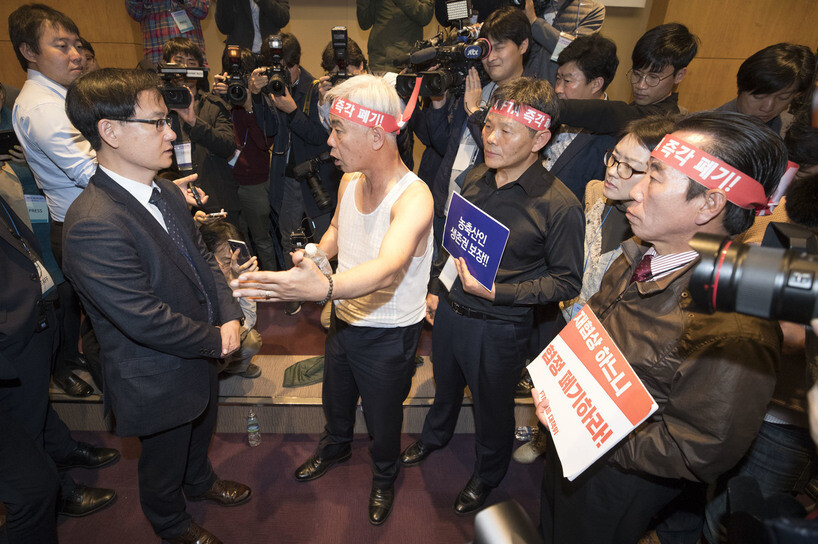hankyoreh
Links to other country sites 다른 나라 사이트 링크
KORUS FTA public hearing descends into chaos

“The administration said it was going to minimize damage to the farming and livestock industries back when it started FTA negotiations with the US. How are things five years later [after the agreement took effect]? Rice and Korean beef prices have all plummeted. We’re not going to be tricked by another formality of a public hearing.”
Thirty minutes in, the public hearing on negotiations to amend the South Korea-US Free Trade Agreement (KORUS FTA) descended into chaos, with shouts echoing through the conference room at Seoul’s COEX center on Nov. 10. The event was hampered – and finally scuttled – by fierce objections from agricultural group’s members to the administration’s hearing process.
Yet the administration concluded that enough of a hearing had been held to meet the conditions according to the Act on the Conclusion Procedure and Implementation of Commercial Treaties. The plan is to finish domestic procedures for the renegotiations with a report shortly to the National Assembly – but the agriculture and livestock industries are up in arms.
The commotion around the COEX conference room started before the hearing was opened at 9:30 am. The Ministry of Trade, Industry and Energy (MOTIE) barred access to “those who did not submit a prior application to attend” – excluding from an FTA response committee members from the Korean Peasants League and Korean Women Peasant Association, as well as members from the Korea Dairy & Beef Farmers Association, Korea Pork Producers Association, Korea Poultry Association, and Korean Native Chicken Association. Prevented from entering, the members protested to the lines of security personnel standing before the closed doors. “We’re stakeholders in this amendment,” they showed. “How can we not get to watch the hearing?”
With the hearing starting in chaos, the administration’s announcement was scant. An explanation on the FTA amendment’s pursuit took up roughly half of the 30-page materials provided by MOTIE. No mention at all was made of the potential damages – or measures to prevent them – from the loosening or abolition on non-tariff barriers and additional beef and farm product market openness that the US is likely to demand.
“We sent a discussion statement to the administration three days ago, and it wasn’t even printed in the book,” said one debate participant. Some farmers protested by hurling eggs and shoes.
Members of farming and livestock industry groups kept up their protest of the hearing for around two hours, chanting calls for an end to the FTA and yelling, “How can we trust the government when it says the farming industry isn’t subject to negotiation?”
Some buttonholed MOTIE officials and pleaded with them to set a new hearing date – “and prepare properly this time.” Attorney Song Gi-ho of the group MINBYUN-Lawyers for a Democratic Society told reporters at the hearing venue that a “hearing without an open discussion is invalid according to the Administrative Procedures Act.”
Once the hearing’s scheduled ending time of 12 pm passed, a MOTIE official declared it adjourned. In a release after the hearing, the ministry said it would “reflect the outcomes of the hearing and economic feasibility examination in a trade treaty conclusion plan to be reported to the National Assembly.” The ministry considered itself to have met its obligation to hold a hearing according to Article 21-4 of the Administrative Procedures Act, which states that the obligation to give prior notice of administrative disposition is waived when “seeking opinions is impractical.”
By Choi Ha-yan, staff reporter
Please direct questions or comments to [english@hani.co.kr]

Editorial・opinion
![[Guest essay] The real reason Korea’s new right wants to dub Rhee a founding father [Guest essay] The real reason Korea’s new right wants to dub Rhee a founding father](https://flexible.img.hani.co.kr/flexible/normal/500/300/imgdb/original/2024/0423/8317138574257878.jpg) [Guest essay] The real reason Korea’s new right wants to dub Rhee a founding father
[Guest essay] The real reason Korea’s new right wants to dub Rhee a founding father![[Column] ‘Choson’: Is it time we start referring to N. Korea in its own terms? [Column] ‘Choson’: Is it time we start referring to N. Korea in its own terms?](https://flexible.img.hani.co.kr/flexible/normal/500/300/imgdb/original/2024/0423/3617138579390322.jpg) [Column] ‘Choson’: Is it time we start referring to N. Korea in its own terms?
[Column] ‘Choson’: Is it time we start referring to N. Korea in its own terms?- [Editorial] Japan’s rewriting of history with Korea has gone too far
- [Column] The president’s questionable capacity for dialogue
- [Column] Are chaebol firms just pizza pies for families to divvy up as they please?
- [Column] Has Korea, too, crossed the Rubicon on China?
- [Correspondent’s column] In Japan’s alliance with US, echoes of its past alliances with UK
- [Editorial] Does Yoon think the Korean public is wrong?
- [Editorial] As it bolsters its alliance with US, Japan must be accountable for past
- [Guest essay] Amending the Constitution is Yoon’s key to leaving office in public’s good graces
Most viewed articles
- 1[Column] ‘Choson’: Is it time we start referring to N. Korea in its own terms?
- 2Opposition calls Yoon’s chief of staff appointment a ‘slap in the face’
- 3[Guest essay] The real reason Korea’s new right wants to dub Rhee a founding father
- 4Senior doctors cut hours, prepare to resign as government refuses to scrap medical reform plan
- 5Why Korea shouldn’t welcome Japan’s newly beefed up defense cooperation with US
- 6New AI-based translation tools make their way into everyday life in Korea
- 7[Editorial] Japan’s rewriting of history with Korea has gone too far
- 8Terry Anderson, AP reporter who informed world of massacre in Gwangju, dies at 76
- 9[Column] Has Korea, too, crossed the Rubicon on China?
- 10[Column] The clock is ticking for Korea’s first lady